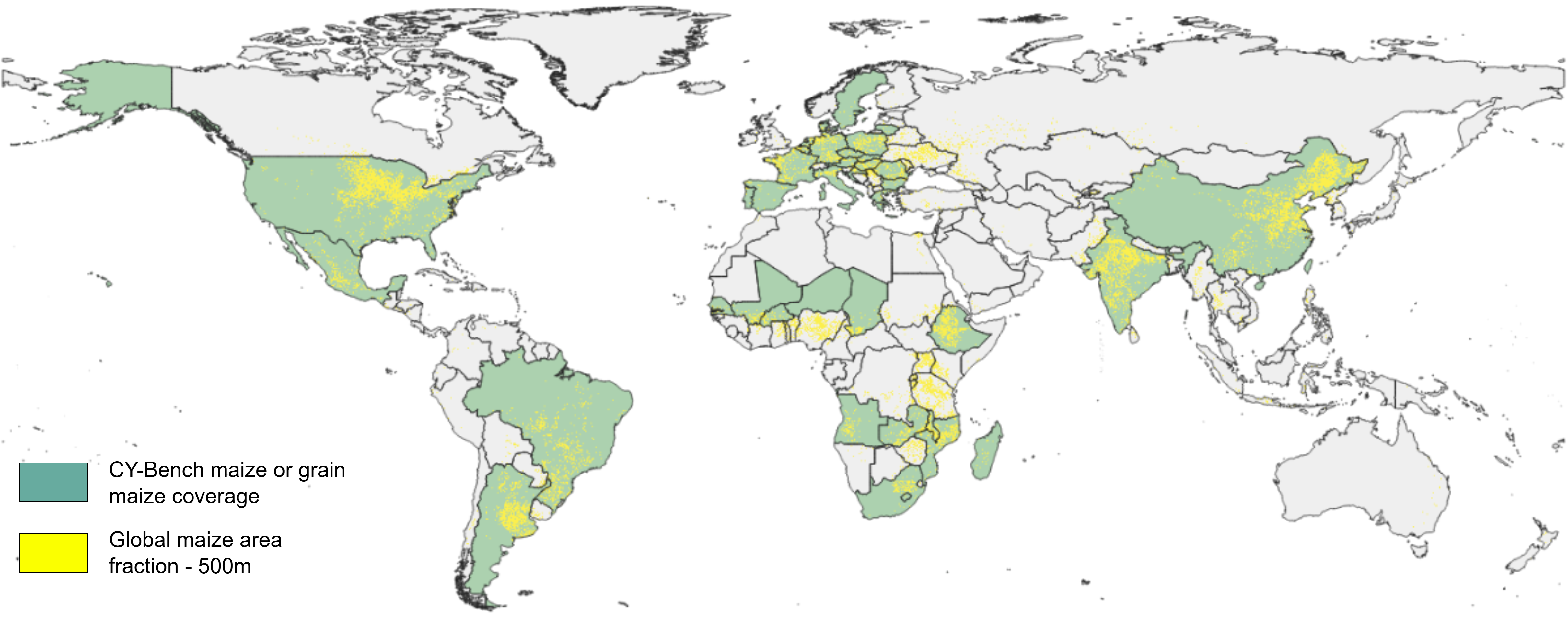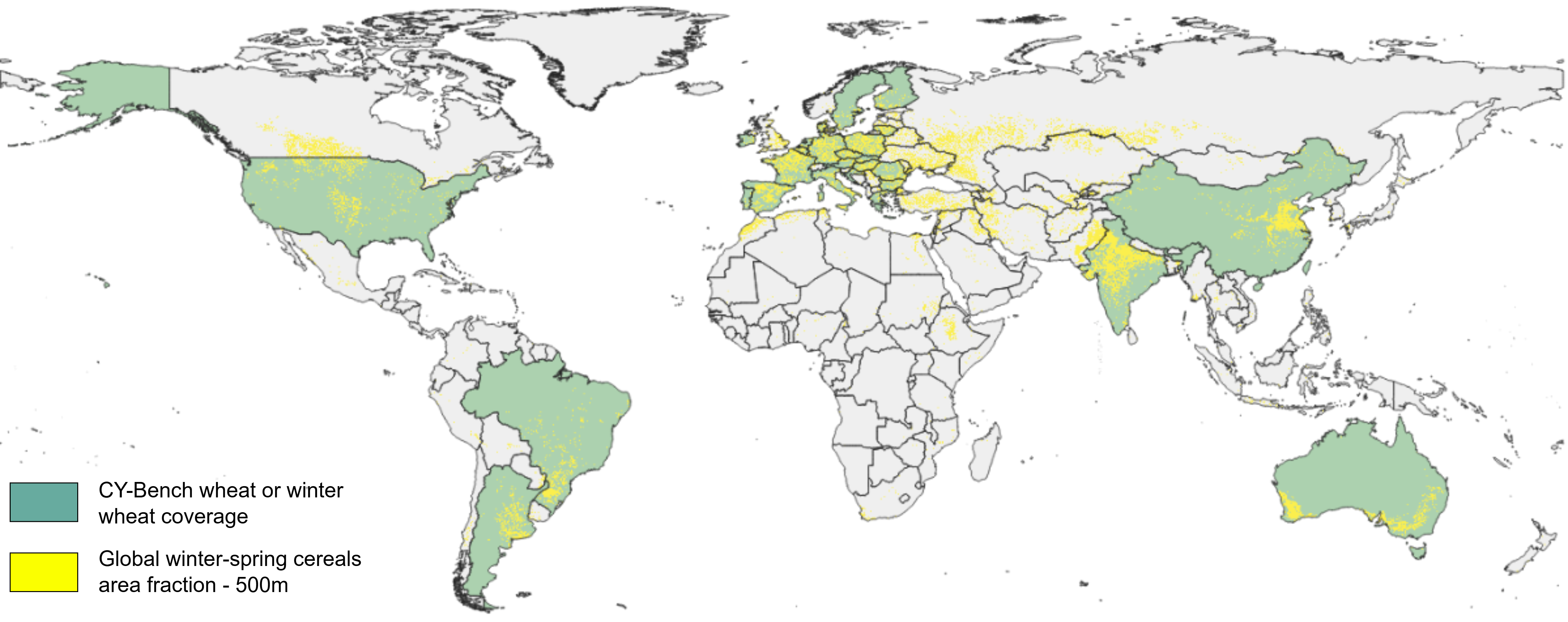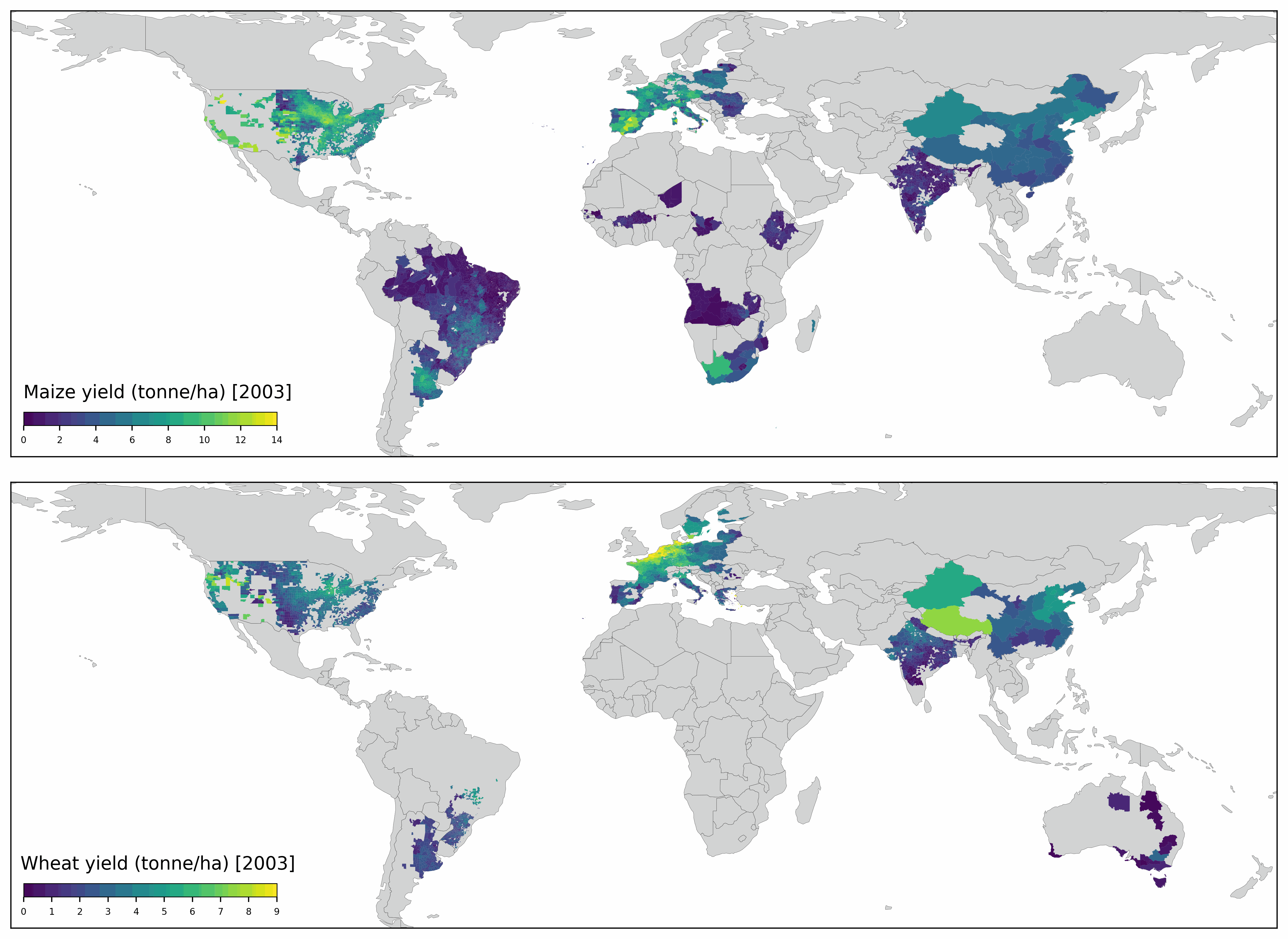AgML - Machine Learning for Agricultural Modeling
AgML is the AgMIP transdisciplinary community of agricultural and machine learning modelers.
AgML aspires to
identify key research gaps and opportunities at the intersection of agricultural modelling and machine learning research,
support enhanced collaboration and engagement between experts in these disciplines, and
conduct and publish protocol-based studies to establish best practices for robust machine learning use in agricultural modelling.
AgML Crop Yield Forecasting
The objective of AgML Crop Yield Forecasting task is to create a benchmark to compare models for crop yield forecasting across countries and crops. The models and forecasts can be used for food security planning or famine early warning. The benchmark is called CY-Bench (crop yield benchmark).
Table of contents
Overview
Early in-season predictions of crop yields can inform decisions at multiple levels of the food value chain from late-season agricultural management such as fertilization, harvest, and storage to import or export of produce. Anticipating crop yields is also important to ensure market transparency at the global level ( e.g. Agriculture Market Information System, GEOGLAM Crop Monitor) and to plan response actions in food insecure countries at risk of food production shortfalls.
We propose CY-Bench, a dataset and benchmark for subnational crop yield forecasting, with coverage of major crop growing countries and underrepresented countries of the world for maize and wheat. By subnational, we mean the administrative level where yield statistics are published. When statistics are available for multiple levels, we pick the highest resolution. By yield, we mean end-of-season yield statistics as published by national statistics offices or similar entities representing a group of countries. By forecasting, we mean prediction is made ahead of harvest. The task is also called in-season crop yield forecasting. In-season forecasting is done at a number of time points during the growing season from start of season (SOS) to end of season (EOS) or harvest. The first forecast is made at middle-of-season (EOS - SOS)/2. Other options are quarter-of-season (EOS - SOS)/4 and n-day(s) before harvest. The exact time point or time step when forecast is made depends on the crop calendar for the selected crop and country (or region). All time series inputs are truncated up to the forecast or inference time point, i.e. data from the remaining part of the season is not used. Since yield statistics may not be available for the current season, we evaluate models using predictors and yield statistics for all available years. The models and forecasts can be used for food security planning or famine early warning. We compare models, algorithms and architectures by keeping other parts of the workflow as similar as possible. For example: the dataset includes same source for each type of predictor (e.g. weather variables, soil moisture, evapotranspiration, remote sensing biomass indicators, soil properties), and selected data are preprocessed using the same pipeline (use the crop mask, crop calendar; use the same boundary files and approach for spatial aggregation) and (for algorithms that require feature design) and same feature design protocol.
Coverage for maize
Undifferentiated Maize or Grain Maize where differentiated 
Coverage for wheat
Undifferentiated Wheat or Winter Wheat where differentiated 
Deciphering crop names
The terms used to reference different varieties or seasons of maize/wheat have been simplified in CY-Bench. The following table describes the representative crop name as provided in the crop statistics The terms used to reference different varieties or seasons of maize/wheat have been simplified in CY-Bench. The following table describes the representative crop names as provided in the crop statistics:
Country/Region |
Maize |
Wheat |
|---|---|---|
Grain Maize |
Soft Wheat |
|
Maize |
N/A |
|
Corn |
Wheat |
|
N/A |
Winter Wheat |
|
Grain Corn |
Grain Wheat |
|
Grain Corn |
Grain/Winter/Spring Wheat |
|
Grain Maize |
Winter Wheat |
|
Maize |
Wheat |
|
Maize |
N/A |
|
White/Yellow Corn |
N/A |
|
Grain Corn |
Winter Wheat |
Targets

Getting started
cybench is an open source python library to load CY-Bench dataset and run the CY-Bench tasks.
Installation
git clone https://github.com/WUR-AI/AgML-CY-Bench
Requirements
Run the following commands to install dependencies or requirements.
pip install poetry
cd AgML-CY-Bench
poetry install
Downloading the sample dataset
You can work with a small sample of the dataset by running
git clone https://github.com/WUR-AI/sample_data.git cybench/data
from the AgML-CY-Bench folder.
Running a reduced version of the benchmark
To check everything is set up correctly, run
poetry run python cybench/runs/run_benchmark.py -d maize_NL -m test
Running the full benchmark
To run the benchmark for many crops and countries, follow the steps for installation and requirements from the previous section in a machine with significant amount of resources (memory and storage).
Get the dataset from Zenodo. After downloading the dataset, move the unzipped data inside AgML-CY-Bench/cybench/data or make sure AgML-CY-Bench/cybench/data points to the directory containing unzipped data.
Unzip the downloaded data:
unzip cybench-data.zip -d <target_dir>
Move the data to the expected data path:
mv <target_dir> cybench/data
or create a symbolic link from cybench/data to the target directory:
ln -sf <target_dir> cybench/data
Run the benchmark on a dataset using
poetry run python cybench/runs/run_benchmark.py -d maize_NL
If you want to write your own model and compare performance with the benchmark, write a model class your_model that extends the BaseModel class. The base model class definition is inside models.model.
from cybench.models.model import BaseModel
from cybench.runs.run_benchmark import run_benchmark
class MyModel(BaseModel):
pass
run_name = <run_name>
dataset_name = "maize_US"
result = run_benchmark(run_name=run_name,
model_name="my_model",
model_constructor=MyModel,
model_init_kwargs: <int args>,
model_fit_kwargs: <fit params>,
dataset_name=dataset_name)
metrics = ["normalized_rmse", "mape", "r2"]
df_metrics = result["df_metrics"].reset_index()
print(df_metrics.groupby("model").agg({ m : "mean" for m in metrics }))
Compare the results (values of metrics for the specified dataset) with the baseline results for the same dataset.
Reproducing the baseline results
The baseline results were produced in the following test environment:
Operating system: Ubuntu 18.04
CPU: Intel Xeon Gold 6448Y (32 Cores)
memory (RAM): 256GB
disk storage: 2TB
GPU: NVIDIA RTX A6000
Benchmark run time
During the benchmark run with the baseline models, several countries were run in parallel, each in a GPU in a distributed cluster. The larger countries took approximately 18 hours to complete. If run sequentially in a single capable GPU, the whole benchmark should take 50-60 hours to complete.
Leaderboard
See tables inside results_baselines
Data sources
Crop Statistics |
Shapefiles or administrative boundaries |
Predictors, crop masks, crop calendars |
|---|---|---|
Weather: AgERA5 |
||
Mali (1) |
Use Africa shapefiles from FEWSNET |
Soil: WISE soil data |
Soil moisture: GLDAS |
||
Evapotranspiration: FAO |
||
FAPAR: JRC FAPAR |
||
Crop calendars: ESA WorldCereal |
||
NDVI: MOD09CMG |
||
Germany (2) |
Use EU shapefiles |
Crop Masks: ESA WorldCereal |
1: Mali data at admin level 3. Mali data is also included in the FEWSNET Africa dataset, but at admin level 1 only.
2: Germany data is also included in the EU dataset, but there most of the data fails coherence tests (e.g. yield = production / harvest_area)
How to cite
Please cite CY-bench as follows:
@dataset{paudel_etal2024,
author = {Paudel, Dilli and
Baja, Hilmy and
van Bree, Ron and
Kallenberg, Michiel and
Ofori-Ampofo, Stella and
Potze, Aike and
Poudel, Pratishtha and
Saleh, Abdelrahman and
Anderson, Weston and
von Bloh, Malte and
Castellano, Andres and
Ennaji, Oumnia and
Hamed, Raed and
Laudien, Rahel and
Lee, Donghoon and
Luna, Inti and
Masiliūnas, Dainius and
Meroni, Michele and
Mutuku, Janet Mumo and
Mkuhlani, Siyabusa and
Richetti, Jonathan and
Ruane, Alex C. and
Sahajpal, Ritvik and
Shuai, Guanyuan and
Sitokonstantinou, Vasileios and
de Souza Noia Junior, Rogerio and
Srivastava, Amit Kumar and
Strong, Robert and
Sweet, Lily-belle and
Vojnović, Petar and
de Wit, Allard and
Zachow, Maximilian and
Athanasiadis, Ioannis N.},
title = {{CY-Bench: A comprehensive benchmark dataset
for subnational crop yield forecasting}},
year = 2024,
publisher = {AgML (https://www.agml.org/)},
version = {1.0},
doi = {10.5281/zenodo.11502142},
}
How to contribute
Thank you for your interest in contributing to AgML Crop Yield Forecasting. Please check contributing guidelines for how to get involved and contribute.
Additional information
For more information please visit the AgML website.